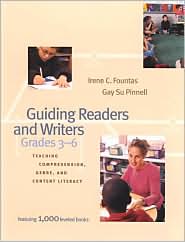Dedicate time to independent reading in class
If you want kids to read independently for homework, you have to dedicate time in class to let them read. You giving up your class time sends a message that you value independent reading and as such, you will dedicate time in class to it.
How much time? In the beginning of the year when you're teaching students the routines of independent reading, you will give them time every day for (at least) the first month. Your first month of school you will be teaching them how to "live the readerly life." You will have mini-lessons about what good readers do, how to select books that are Just Right, and how to use the classroom library. You can find mini-lessons on this in Lucy Calkin's curriculum (her first unit is a month of lessons on this topic) or in this book by Fountas and Pinnell:
I know it says it's for grades 3-6, but I have used the mini-lessons for seventh and eighth grade, too. You can find them in chapter 9, page 142.
In the beginning of the school year, kids will read in class and at home. Homework every night in my middle school reading class? Read 20 pages and do strategy work or response prompts in your Reader's Notebook. Always. Every day of your middle school life. This is always the homework and rarely did I assign anything else.
After kids get the habits of independent reading, you change your class time to one day a week of independent reading at school. Keep it the same - the day doesn't matter, but the consistency does. Kids will come to expect the time to read in class. They will know that on Friday, there will be class time to get a new book or talk to a peer or teacher about reading. They will plan for it, just like you will.
More to come: Middle school schedule with direct teaching and independent reading.
Status of the Class
Kids who are not reading can't talk about their books with their teachers. This is why Status of the Class (read about what that is here - it's a non-negotiable for Reading Workshop) is so very important! During Status of the Class I call out to each student to ask what page they are on. I take status every. day. of. my. school. life. The kids know this. They know I'm going to ask them what page they're on.
The first thing you'll notice when doing Status is that some kids will abandon a lot of books. They'll tell you, "I lost that book. I don't know what to read next," or "I didn't like it, it was boring." As I hear Status reports from kids like this, I might be wondering, "Was the book a future book? Was the book boring? What interests does the child have? I need to match them with a great book!"
Comments like these are bound to happen and when they do, I naturally begin to pay closer attention to that child each day that I call them for Status. I continue tracking their Status on the calendar and may also note some other observations. Additionally, I will want to talk to that child 1:1 as soon as possible to help them get matched with a better book.
Please know: There will be LOTS of kids who will *really* be reading along in their books (and some reporting that they are, when in all actuality, they are not)! You won't be red-flagging all kids.
That being said, the teacher will, sooner or later, become suspicious about some kids - wondering if they really are reading all those pages...and so you'll ask them, "How's that book going?" You can tell right away if the child is reading the book or not (and if they are real-reading or fake-reading!) A child who is genuinely reading the book will have answers to all your questions. They won't just say, "It's cool." (RED FLAG!) They'll be able to elaborate about it. And if they can't, you'll know that it's a fake reading-situation. At that point, you'd sit down with the child for a conference about the book. (More to come on that later.)
So, conversations that stem from Status of the Class will help you know whether or not students are reading. Please know, it takes time to see patterns. You're going to have to trust me on this though - If you do Status of the Class every day without fail, you will see patterns. You will know who is reading and who is not!
Response to Books
Daily homework in my class was strategies and responses written in a Reader's Notebook. So, when I taught kids that good readers predict, then they read their Just Right book for homework and wrote down predictions from their book. The next week, when we moved on to questioning, the kids then wrote questions about their JR book in their notebook.
When students finished their books, they then had to write about them. We did this with class blogs at edublogs. (If I did this again, I'd use Blogger!) Anyways, the routine in my class was: read a book, write a blog, check out a new book. I knew who was where in the process because of Status of the Class.
Teachers have emailed me to ask, "Michelle, how do you know they're really reading and writing their own response and not just looking up a review online to write their blog?"
In most cases, you will know. I've had countless kids copy and paste reviews from Amazon or any other site the reviews books. How did I know? Because middle school kids don't write super complex sentences with vocabulary they don't understand, punctuated and spelled perfectly! When kids are really writing blogs every week, you'll know what kind of writer they are and so when they submit a blog and you read it and wonder if someone else wrote it, you're right! So then it's a conversation about plagiarism.
Here's the thing: Reading Workshop is messy. When you teach with this kind of philosophy, you are telling kids, "I trust you. I will guide you, but I also trust you to make good decisions." It's a process and you will learn as you go, but it's so much better than relying on a computer program that asks low-level, multiple-choice questions to know whether or not kids are reading! Kids should be reading because real-life people in the real world read for fun and to learn things, not because of some silly questions and some points and prizes from a reading program.
Does this give a little more insight to how teachers would manage independent reading without AR? What questions do you still have? You know how sometimes, when you know a topic really well, you think you're explaining it well, but in all actuality, you're not? That's how I feel sometimes...this moment included!
I hope this illuminates how we can create independent readers without the carrot-and-stick method that is Accelerated Reader!
Have a great weekend!
























What a fabulous post, with so many ideas. How would you modify for a first grade class? Thanks! Have a great weekend!!
ReplyDeleteAlyce
AMEN!! YOU NAILED IT!!!! Very clear...you actually gave me some good "answers" to use! :-)
ReplyDeleteHi there, I found your web site website development timeline via Google while looking for a related topic, your website came up, it looks good. I have bookmarked it in my google bookmarks
ReplyDelete